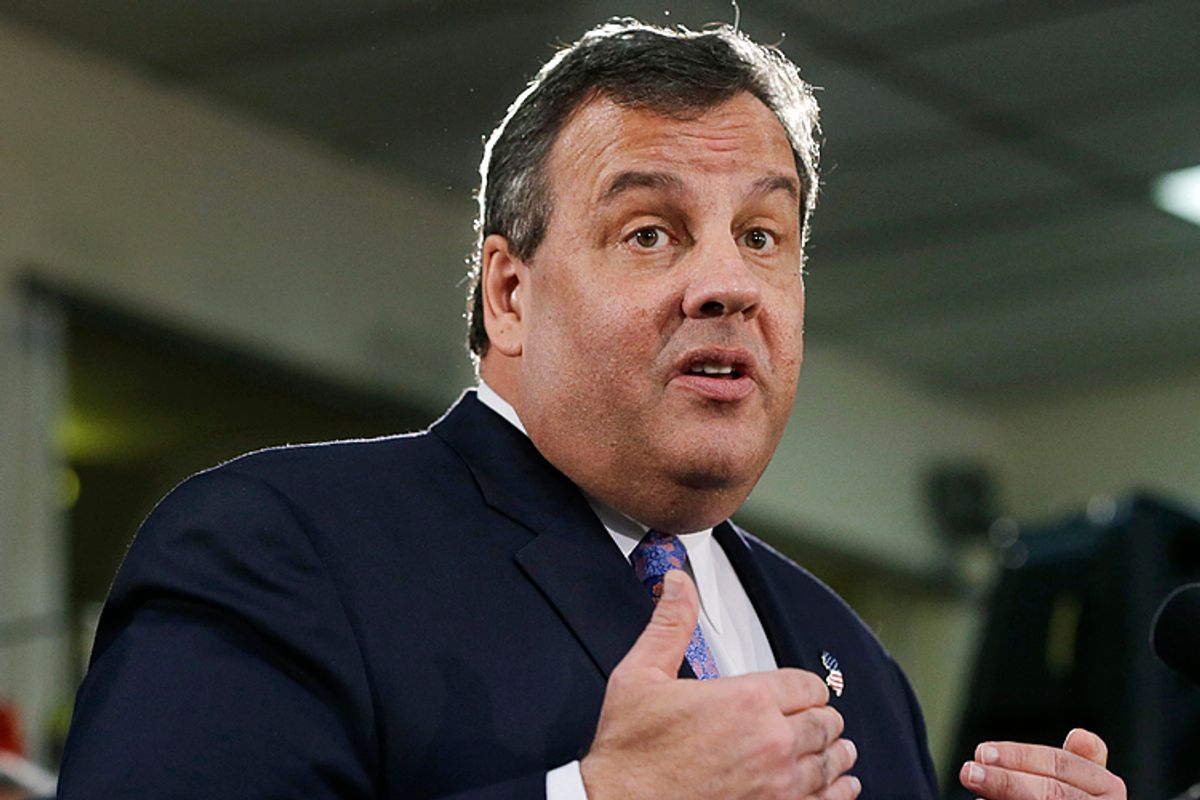Although 30 percent of Republicans say they would never cast a presidential vote for Chris Christie, according to a new poll, the New Jersey governor enjoyed a notably positive response from the conservative audience at CPAC on Thursday afternoon. Taking the stage to cheers — and even a smattering of celebratory hoots — Christie seemed like his old, pre-Bridgegate self, delivering a healthy dose of conservative red meat while simultaneously portraying himself as the rare politician who can win converts from the other side through the strength of his personality and ideas.
Christie led off by touting his accomplishments in Trenton, bragging that his administration had done “what they should be doing in D.C.” by reforming the state’s public workers’ fund through raising the retirement age, cutting benefits, and scaling back his predecessor’s earlier guarantees. Christie acknowledged that his dose of austerity did not please New Jersey’s public employees, but told the CPAC crowd that he ultimately won over many public workers by telling them he understood why they were upset but didn’t understand why they were blaming “the first person to tell you the truth [about your pensions].”
“You may hate me now,” Christie said he told these public workers, “but 10 years from now, after I’ve made the changes that need to be made and you’re collecting your pension … you’ll be sending me a thank you note for saving retirement for you and your families.” By the time he walked off the stage, Christie claimed, “two-thirds of the audience was cheering."
Having established his willingness to speak truth to what CPAC’s conservative audience thinks is power, Christie went on to urge his fellow conservatives to “start talking about what we’re for and not what we’re against.” This was a winning strategy, Christie claimed, for one simple reason: “Our ideas are better than their ideas and that’s what we have to stand up for.”
As an example of the Democrats’ inferior ideas, Christie referenced Sen. Majority Leader Harry Reid’s ongoing war of words with the Koch brothers, who Christie didn’t mention by name, opting instead to refer to them as “two entrepreneurs” who were “great Americans.”
“Harry Reid should get back to work,” Christie said, “and stop taking on great Americans.”
Christie, who is currently the chair of the Republican Governors Association, next celebrated the work being done by GOP governors such as himself throughout the country, singling out Scott Walker, John Kasich, Rick Snyder, and Rick Scott as particular exemplars of Republican virtue. Christie applauded Walker for changing Wisconsin’s collective bargaining laws in such a way that its public employee unions had seen their memberships drop by 60 percent. He also lauded Snyder for making Michigan a right-to-work state, despite its being the birthplace of the AUW.
These governors, Christie said, were, unlike President Obama, true leaders. Describing the failure of the Simpsons-Bowles deficit austerity commission to reach an agreement (a development guaranteed, in part, by one of Christie’s fellow speakers at CPAC, Paul Ryan, refusing to agree to any tax increases whatsoever) as Obama’s fault, Christie bellowed, “If that’s your attitude, Mr. President, what the hell are we paying you for?” It was a line that inspired what may have been the largest round of applause of the conservative conference thus far.
The audience was less enamored, however, with Christie’s argument that Republicans must prove to voters that their pro-life stance is not exclusive to the womb and that Republicans "need to be pro-file when [people] leave the womb as well, for every step in their lives.” Similarly tepid was the response when Christie advocated for rehabilitation rather than incarceration for nonviolent drug offenders.
Yet the New Jersey Republican quickly won CPAC’s activist audience back on his side by turning again to bashing Obama. “We don’t need your opinion, Mr. President, on what inequality is,” Christie said. "We don’t have an inequality problem; we have an opportunity problem, because government is trying to control the private market.”
After a brief foray into criticizing Obama’s foreign policy — which, according to Christie, had turned the U.S. into a nation "that allows other countries to run us over all over the world” — Christie wrapped up with what has long been his fundamental argument to conservatives for picking him as the GOP’s 2016 nominee: electability.
"We don’t get to govern if we don’t win,” Christie said. “So let’s come out of this conference resolved to win elections again.” Despite Christie’s well-documented troubles with his party’s activist base, this closing exhortation was greeted with a boisterous round of applause.



Shares